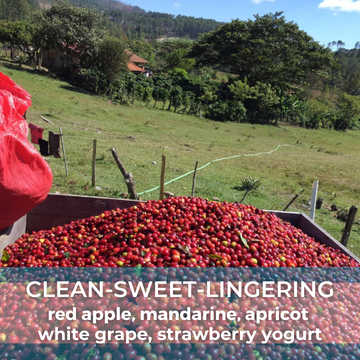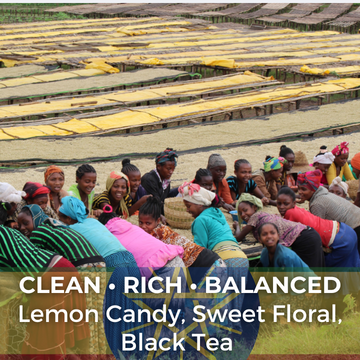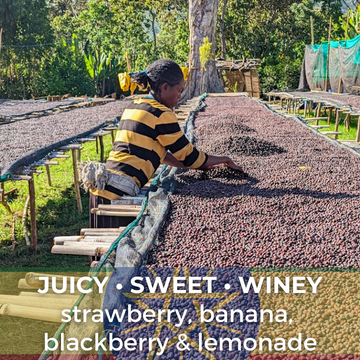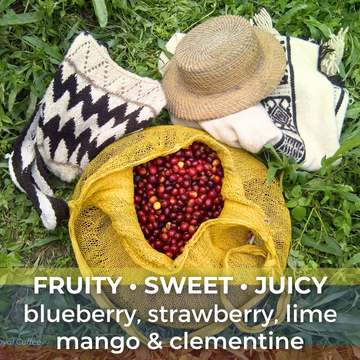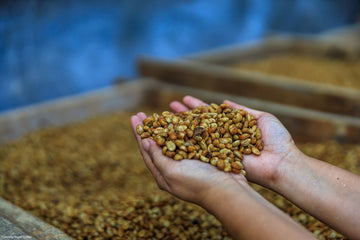Tanzania Ngorongoro Finagro Estate Peaberry
Tanzanian Peaberry has become a household name in the specialty coffee world. Despite making up only 5-10% of coffee cherries harvested, this little naturally occurring mutation is in higher demand than all other sorting sizes. This is a single estate peaberry lot from the Vohora siblings! It’s super clean with crisp acidity and excellent balance. It’s got a medium to full body with a smooth, silky texture. The biggest notes in our cups were meyer lemon, ripe black cherry and milk chocolate with a drizzle of caramel.
Tanzanian Peaberry has become a household name in the specialty coffee world. Despite making up only 5-10% of coffee cherries harvested, this little naturally occurring mutation is in higher demand than all other sorting sizes. Tanzania has more than 10 recognized coffee grades including the elusive triple A, but when coffee folks hear Tanzania, our minds immediately jump to peaberry. That’s some Juan Valdez level marketing when you think about it! In fact, there’s so much demand for Tanzania Peaberry that most of it gets blended into regional or even national lots by big exporters. It’s surprisingly rare to find a single farm lot like this offering!
When it comes to knowing Tanzanian coffee, the Vohora family are experts. Brother and sister duo Neel and Kavita manage the farm and mills with an eye for exceptional, consistent coffee quality as well as sustainable farm management and environmental health. Their handiwork is clear in this cup. It’s super clean with crisp acidity and excellent balance. It’s got a medium to full body with a smooth, silky texture. The biggest notes in our cups were meyer lemon, ripe black cherry and milk chocolate with a drizzle of caramel. We also got fresh orange zest, but I’m willing to concede that may have been purely because we were cupping it alongside the Vohora’s Citric Carbonic micro lot! Either way, this coffee is a perfect and delicious example of Tanzanian Peaberry, don’t miss it!
Reminder! This coffee is raw, you must roast it before brewing
Arrival Date: July 21st, 2023. US Arrival: May 2023, packed in AgroZ hermetic bag.
Acidity & Brightness: Crisp and slightly sweet
Balance & Finish: Exceptionally balanced with a slightly floral finish
Body & Texture:Medium to Full bodied, smooth and silky
Flavors: Black cherry, meyer lemon, orange zest, caramel & milk chocolate
Grade: Peaberry, grown at 1600-1800 masl
Certification: Rainforest Alliance
Processing: Fully washed and dried in raised beds
Grower: Neel and Kavita Vohora | Finagro Estate
Region: Karatu District, Arusha Region, Tanzania
Varieties: Bourbon (N39), Kent, SL-28, and SL-34, TACRI, Ruiru-11, Batian
Recommended Roast Range: City+ to Full City+ (Light-medium to medium-dark)
We like this coffee best right at a Full City (full medium) roast, where its flavors were exceptionally balanced in our roasts. For most roasters, that roast level occurs during the pause after 1st crack ends and before 2nd crack begins. If you are looking to pull even more crisp acidity out of the cup, go a little lighter, or as 1st crack is beginning to trail off. At darker roasts, from 2nd crack on, the milk chocolate will become more like dark chocolate and you’ll get an increase in body from the cup, but you’ll lose a bit of acidity as a tradeoff. Peaberry is a favorite of beginners and seasoned veterans alike since the shape naturally lends itself to consistent, even roasting.
Royal Coffee - "Tanzania peaberries are considered an East Africa classic and are constantly in high demand. Many of them, however, tend to trade on an outsize reputation and with less than perfect traceability. Nonetheless there certainly are exceptions, such as this coffee: a single-estate peaberry lot from the Vohora siblings, part of an outstanding, multi-generational family who take climate preservation and quality equally seriously.
Finagro Estate
Finagro Estate is a 600-hectare coffee plantation in the Karatu district of Tanzania. The estate is technically comprised of two conjoined farms—Ascona and Helgoland—and is currently owned and managed by Neel and Kavita Vohora, siblings, multi-generation coffee growers, and agricultural entrepreneurs in this extremely unique part of East Africa. Both farms are cultivated along the rim of the Ngorongoro Crater, the largest unbroken caldera in the world and a breathtakingly scenic landscape of escarpments and fertile open range that has been a UNESCO World Heritage site since 1979.
The coffee planted on Finagro is sub-divided into blocs by microclimate or cultivar, allowing the Vohoras and their harvest staff of 850 to manage each specific need of the farm in an orderly way. Neel and Kavita have been steady suppliers for Royal for a few years, and beyond the ever-in-demand peaberries that have become synonymous with Tanzania specialty, the brother and sister have put their size and expertise to use introducing a dizzying variation of processing styles into the world. Some of which we are also lucky to cup and carry each year.
Processing for the peaberry lots involves a brief cherry fermentation lasting 24 hours after picking. Then the coffee is depulped, fermented for 36-72 hours, shade dried for 3 days, and finished by drying in full sun for another week.
Why Peaberries?
Peaberries are far more prevalent in Tanzania exports than almost anywhere else in the world other than Kenya. Together, the two neighboring countries are really the only ones to have successfully commercialized the grade. In Tanzania’s case, peaberry coffee is regularly in higher demand than larger screensizes; so much so that the grade is practically synonymous with Tanzania’s specialty sector. This is thanks to many years of successful marketing of what is, in every coffee producing country, a naturally-occurring mutation of the seed that accounts for 5-10% of all coffee worldwide. Peaberries from specialty producers and high elevations roast beautifully thanks to the tightly-controlled size and density, and for the same reason the cup is often more focused and clearer than multi-screen versions of the same coffee.
The Vohora Family & Ngorongoro
Since 1971, the Vohoras have owned about 1000 hectares of farmland on the southern exterior slopes of the Ngorongoro caldera near the town of Karatu in Tanzania’s lush rift valley. The Vohora farms possess Rainforest Alliance certificate, and the family and their 50+ full-time employees (and 1500 seasonal workers) on the farm have done a remarkable job of upkeep and preservation of natural beauty while also running a thriving coffee business. They are diversifying into macadamia and honey, provide temporary housing for harvest labor, and even supply land on the farm for local smallholders to grow beans - a mutually beneficial crop as the legumes fix nitrogen in the soil, a critical step in a healthy cycle of crops.
Tanzania’s commercial coffee production began under colonial control of European nations. The farms’ names are testament to the German influence of the late 1800s, but it was the British who encouraged large-scale productivity in the 1920s. Edelweiss Farm and the two farms comprising Finagro were transferred to the administration of one B.N. Vohora, an Indian farm manager, who would later buy the farm at an auction. His son Ajai runs the family business now from Nairobi. Ajai’s own children, Neel and Kavita, are the day-to-day managers and innovators on the ground in Tanzania keeping the farm alive and prosperous. Kavita manages the dry mill and warehouse in Arusha, while Neel aids with the management of the farms and wet mills.
Today, Neel and Kavita are third-generation Tanzanians, and their family has been in the Tanzanian coffee business since the end of the second World War. The family export business based in Arusha has more than 60 years’ experience in the country.
Finagro Estate, to us, is a coffee paradise. Natural forest canopy shades the trees over the combined 600 hectares of land, much of which is left to natural forest. There are four new reservoirs and a dam allowing efficient irrigation and conservation of water. Growing mainly Kent (a Bourbon variety first cultivated in India) along with newly maturing SL-28s and SL-34s, and other newer Kenyan cultivars, the clear focus is quality, and it’s exhilarating to see the attention and dedication of two young farmers who are clearly resolved to make the most of their very special corner of the planet.”
